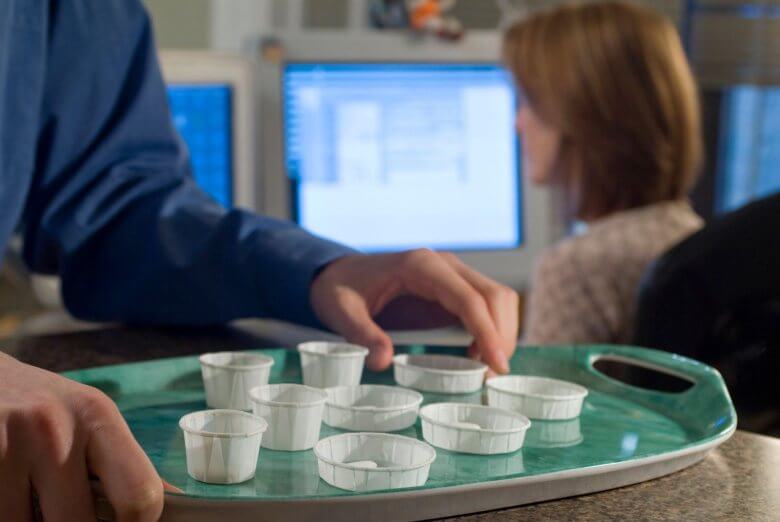Highlights
- Rosuvastatin (Crestor) is a common prescription drug that lowers cholesterol.
- While cholesterol is naturally found in the body, too much cholesterol can put you at risk for heart disease or stroke.
- Rosuvastatin is used to treat high cholesterol, mixed hyperlipidemia, high triglycerides, primary dysbetalipoproteinemia, and homozygous familial hypercholesterolemia.
- While rosuvastatin is generally safe for many individuals, it is not recommended for pregnant or nursing mothers or those who have an active liver disease.
- Rosuvastatin may lead to several side effects, including but not limited to headache, muscle aches, abdominal pain, weakness, nausea, or tiredness.
High cholesterol can put you at risk of heart disease and stroke, two of the leading causes of death. While diet and exercise can help lower your cholesterol naturally, these steps aren’t enough for some individuals. If you have high cholesterol, your doctor may have told you about rosuvastatin (Crestor), a prescription drug that lowers cholesterol.
Cholesterol is a waxy substance that is naturally found in all cells in the body, and your body needs cholesterol to produce new cells, vitamins, and hormones. But when you have too much of the “bad” cholesterol (low-density lipoprotein, or LDL), it can build up in your arteries. This restricts blood flow and can increase your risk of a heart attack or stroke.
It’s estimated that two in every five adults in the United States have high cholesterol. If you’re one of them, read on to learn about rosuvastatin and how it might help you lower your cholesterol — and your risk of developing heart disease.
What Is Rosuvastatin and What Is It Used For?
Rosuvastatin is designed to lower LDL cholesterol in the blood and reduce an individual’s risk of a heart attack, stroke, or other serious event or condition. The drug gained FDA approval in 2003 after showing efficacy in clinical trials.
Rosuvastatin is available under the following brand names:
This medication is commonly prescribed to treat the following:
- Hyperlipidemia (high LDL cholesterol)
- Mixed hyperlipidemia (a genetic disorder)
- High triglyceride levels
- Primary dysbetalipoproteinemia (an inherited condition that causes high cholesterol and triglyceride levels)
- Homozygous familial hypercholesterolemia
This medication can be prescribed alone or in combination with other medications and lifestyle changes.
How Does Rosuvastatin Work?
Rosuvastatin belongs to a class of drugs called statins, which are primarily used to lower cholesterol levels and reduce the risk of cardiovascular disease.
This medication works by inhibiting an enzyme called HMG-CoA reductase, which plays a role in synthesizing cholesterol in the liver. Statins like rosuvastatin block this enzyme to reduce cholesterol production.
Producing less cholesterol leads to lower LDL in the bloodstream. It also stimulates LDL receptor activity on the surface of liver cells. LDL receptors play a crucial role in removing LDL cholesterol from the bloodstream, so increased activity contributes to lower cholesterol levels.
Rosuvastatin also increases the high-density lipoprotein (HDL, or “healthy” cholesterol) in the blood to help counteract the negative effects of LDL.
Rosuvastatin Dosage and Administration
Rosuvastatin comes in tablet and capsule form and is usually taken once per day by mouth. It’s best to take it at the same time every day.

This medication is available in several dose strengths:
- Tablets: 5 milligrams, 10 milligrams, 20 milligrams, or 40 milligrams
- Capsules: 5 milligrams, 10 milligrams, 20 milligrams, or 40 milligrams
Typically, the 40 milligram dose is only recommended for patients not reaching their LDL goals with the 20 milligram dose.
For pediatric patients, the recommended dose does not exceed 20 milligrams.
The dosage regimens above are general guidelines; only a healthcare provider can determine the appropriate dosage for an individual.
How Should I Take Rosuvastatin?
Rosuvastatin can be taken with or without food. Your doctor will determine your dosage based on your medical condition, age, and response to treatment.
Swallow tablets and capsules whole; don’t chew or crush the medication. If you struggle to swallow the capsules, you can open the capsule and sprinkle the granules into soft food, such as applesauce or pudding.
If you are also taking aluminum and magnesium hydroxide antacids, such as Maalox, take them at least two hours after taking rosuvastatin.
While rosuvastatin can be taken at any time of day, it’s best to stick to a regular dosing schedule.
Talk to your doctor before stopping this medication, as stopping statins abruptly can lead to withdrawal symptoms and/or serious health problems.
What Are the Potential Side Effects of Rosuvastatin?
No medication is without side effects, including those deemed generally safe for most individuals. When taking rosuvastatin, you may experience one or more of these common side effects:
- Headache
- Muscle ache
- Abdominal pain
- Weakness
- Nausea
- Tiredness
Less common but more serious side effects have occurred. Notify your doctor right away if you experience any of the following:
- Unexplained muscle pain or weakness, especially with a fever
- Jaundice (yellowing of the skin and eyes)
- Dizziness
- Confusion
- Signs of an allergic reaction
- Memory loss or forgetfulness
- Loss of appetite
- Dark-colored urine
No list of side effects is complete. Consult with your doctor regarding any concerns before or when taking rosuvastatin.
What Should I Avoid When Taking Rosuvastatin?
The following are precautions you should take while you’re on this medication.
- Avoid starting new medications until you speak with a pharmacist about potential drug interactions.
- Talk to your healthcare provider if you are pregnant or plan to become pregnant.
- If rosuvastatin makes you feel dizzy, don’t drive a car or operate machinery until you feel better.
What Should I Do If I Miss a Dose of Rosuvastatin?
If you’re more than a few hours late for your dose, skip it and take your next dose at your regularly scheduled time. Never double up on doses to make up for a skipped dose. Taking two doses close together will increase your risk of side effects.
What Should I Do If I Overdose on Rosuvastatin?
If you or someone else overdoses on this medication, get immediate medical attention.
What Precautions Should I Take With Rosuvastatin?

Before taking rosuvastatin:
- Inform your doctor and pharmacist about any allergies to rosuvastatin, other medications, or ingredients in rosuvastatin tablets or capsules. You can request a list of ingredients from your pharmacist.
- Share with your doctor and pharmacist a comprehensive list of prescription and over-the-counter medications. This list should also include vitamins, supplements, and herbal products you’re taking or plan to take. Your doctor may adjust doses or monitor you for side effects accordingly.
- Tell your doctor if you’re using aluminum and magnesium hydroxide antacids (such as Mylanta or Maalox). Always take them at least two hours after taking rosuvastatin.
- Notify your doctor of any history of liver disease. They may need to conduct liver function tests, even if you have no symptoms. Your doctor may advise against rosuvastatin if you have liver issues or indications of developing liver problems.
- Inform your doctor of other specific conditions. These include if you are of Asian heritage, consume more than two alcoholic beverages daily, are 65 years or older, or have a history of seizures, muscle issues, low blood pressure, diabetes, or kidney or thyroid disease.
- Tell your doctor if you’re pregnant or planning to become pregnant.Rosuvastatin should be avoided during pregnancy. If you’re breastfeeding, avoid doing so while taking rosuvastatin.
- Before undergoing any surgery, including dental procedures, inform the attending healthcare provider about your rosuvastatin usage. In case of hospitalization due to injury or infection, make sure that all providers are aware that you’re taking rosuvastatin.
- Consult your doctor regarding safe use of alcoholic beverages while on rosuvastatin. Alcohol may increase the risk of severe side effects.
Contraindications
Some people should not take rosuvastatin. Others should use it with caution under close medical supervision.

Keep in mind that these lists are general guidelines. In special cases, doctors may feel the benefits of taking a particular medication outweigh the risks, so if you are in one of these groups, talk to your doctor about your personal situation.
Who Should Not Take Rosuvastatin?
Do not take rosuvastatin if you:
- Are pregnant, plan to become pregnant, or suspect you might be pregnant
- Are breastfeeding
- Have a known hypersensitivity to rosuvastatin or its ingredients
- Have an active liver disease
Who Should Take Rosuvastatin With Caution?
You should use rosuvastatin with caution if you:
- Drink large amounts of alcohol
- Have a history of chronic liver disease
- Have predisposing factors to myopathy
Are There Any Other Potential Drug Interactions With Rosuvastatin?
A significant number of medications can interact with rosuvastatin.
The most important potential drug interactions to be aware of include:
- Cyclosporine. Using rosuvastatin and cyclosporine together may have dangerous side effects on your muscles.
- Gemfibrozil. Using rosuvastatin and gemfibrozil may lead to dangerous side effects on your muscles.
- Atazanavir. This combination may increase the amount of rosuvastatin in the bloodstream, which may lead to liver disease.
For the complete known interactions list, visit the Drugs.com Drug Interactions Checker. However, no list of potential drug interactions is complete, so let your provider know if you experience any new or unusual symptoms after taking this medication.
Rosuvastatin as Part of a Healthy Lifestyle
It’s essential to talk to your doctor about your health history and current medications and supplements to see if rosuvastatin is right for you.
While rosuvastatin can help lower cholesterol, lifestyle changes — such as maintaining a healthy weight, getting regular exercise, and eating a healthy diet — are also a critical part of treatment for elevated cholesterol.
You will also need to have regular checkups with blood tests to monitor your cholesterol levels and liver function while taking rosuvastatin.
Now that you know more about rosuvastatin, the next step is to get your prescription for the most affordable price.
Get the Lowest Price for Rosuvastatin With BidRx
BidRx makes getting affordable prescriptions easier than ever. Create a free account, upload your prescription, and let multiple pharmacies compete for your business with their best price. You’ll save money and your prescriptions will be delivered to your door.
Get started with a free BidRx account today!
This information is intended for general informational purposes only. It is not a substitute for professional medical advice, diagnosis, or treatment. Always seek the advice of your physician or other qualified health provider with any questions you may have regarding a medical condition or medication.
